Did you know that the average truck has a 19.4% chance of making it to 250,000 miles or more? This surprising statistic challenges the common perception that a vehicle’s usable lifespan ends at 100,000 miles.
Modern vehicles are getting more durable, with 30 models now offering a 12 to 36% chance of reaching a quarter million miles. Recent studies have analyzed over 402 million vehicles to determine which trucks truly go the distance.
We’re excited to share our findings on the top-performing truck models and what makes them stand out in terms of longevity. For personalized advice, you can contact us directly via WhatsApp at +44-7822010953.
Key Takeaways
- Understanding truck longevity and its impact on your investment
- Exploring the latest research on durable truck models
- Learning how to use truck reliability ratings to guide your purchasing decisions
- Discovering top-performing truck models across different categories
- Maximizing your investment with long-lasting trucks
Understanding Truck Reliability: What Makes a Truck Dependable
Understanding what makes a truck dependable involves analyzing various data points and reliability metrics. Truck reliability is not just about withstanding the test of time but also about maintaining performance over a significant mileage.
Several factors contribute to a truck’s reliability. We analyze these factors in detail below.
Key Factors That Determine Truck Reliability
Truck reliability is influenced by multiple factors including the model‘s design, manufacturing quality, and maintenance history. Organizations like iSeeCars analyze data from millions of vehicles to determine longevity patterns.
How Reliability Ratings Are Measured
Reliability ratings are measured using a proprietary model that estimates the probability of a vehicle surviving to various mileage thresholds, such as 200,000 or 250,000 miles. This analysis excludes models with insufficient data but includes heavy-duty trucks in truck-specific analyses.
| Factor | Description | Impact on Reliability |
|---|---|---|
| Design and Manufacturing | Quality of the truck’s design and manufacturing process | High-quality design and manufacturing enhance reliability |
| Maintenance History | Regularity and quality of maintenance performed on the truck | Regular and proper maintenance significantly improves reliability |
| Driving Conditions | Typical driving conditions the truck is subjected to | Harsh driving conditions can negatively impact reliability |
By understanding these factors and how reliability ratings are measured, we can better assess which trucks are likely to provide long-term dependability.
Why Truck Longevity Matters for Buyers

Truck longevity is more than just a measure of durability; it’s a key determinant of the vehicle’s long-term value. When evaluating trucks, buyers should consider not just the initial purchase price, but the overall cost of ownership, including maintenance, repairs, and resale value.
Cost Benefits of Owning a Reliable Truck
Owning a reliable truck can significantly reduce long-term costs. With lower maintenance and repair needs, reliable trucks like those from Toyota, Ram, and GMC offer substantial cost savings over their lifespan. According to the data, Toyota leads in longevity, with a 17% chance of its trucks lasting 250,000 miles.
Resale Value and Long-Term Investment
The resale value of a truck is directly tied to its reliability and longevity. Trucks from brands known for their durability, such as Toyota, command higher prices in the used market. Our analysis shows that reliable pickup trucks maintain their value better over time.
| Brand | Chance of Lasting 250,000 Miles | Relative Longevity |
|---|---|---|
| Toyota | 17% | 2x average |
| Ram | 11.5% | 1.3x average |
| GMC | 11.4% | 1.3x average |
| Ford | 9.5% | 1.1x average |
The Most Reliable Trucks and Their Ratings in 2024

In 2024, the quest for the most reliable trucks continues, with data revealing the top performers. According to iSeeCars, pickup trucks, particularly heavy-duty models, have shown impressive longevity. On average, these vehicles are 19.4% likely to reach 250,000 miles or more.
Understanding the 250,000+ Mile Benchmark
The 250,000-mile benchmark is a significant indicator of a truck’s reliability and durability. Eleven truck models have demonstrated a higher-than-average likelihood of surpassing this milestone. Heavy-duty pickup trucks dominate this list, with models like the Ram 3500 and Chevrolet Silverado 2500HD showing remarkable longevity.
How These Ratings Compare to Industry Averages
Truck reliability ratings are compared to the broader automotive industry to gauge their performance. Notably, trucks average a 19.4% chance of reaching 250,000 miles, significantly higher than the 8.6% average for all vehicles. The data also highlights a decline in truck longevity from 25.9% in 2023 to 19.4% in 2024, indicating a need for continued improvement in truck manufacturing.
Ram 3500: The King of Longevity
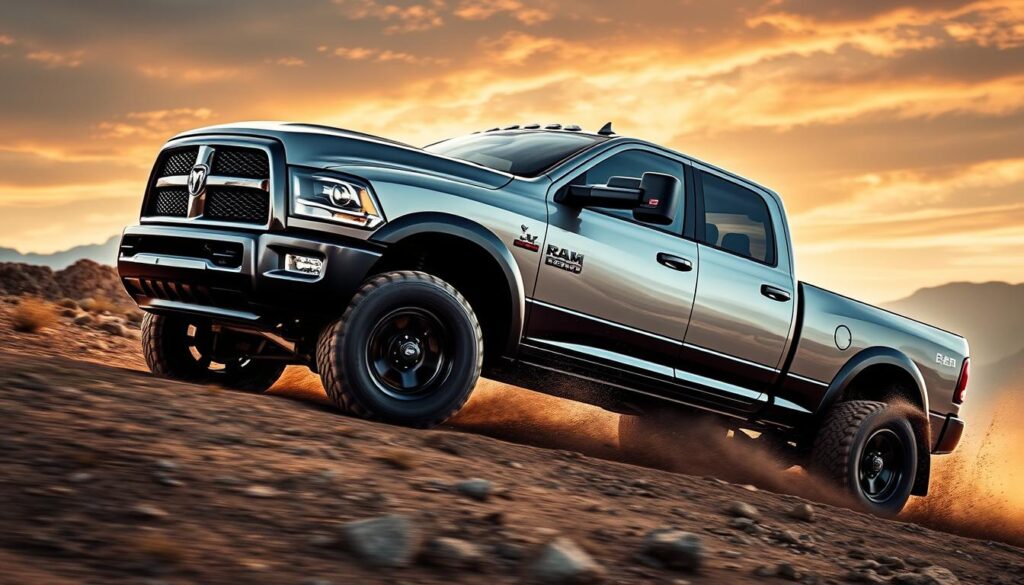
When it comes to longevity, few trucks can match the Ram 3500’s impressive record. The Ram 3500 is celebrated for its robust build and reliable performance, making it a top choice for those seeking a long-lasting truck.
Performance Specs and Reliability Features
The Ram 3500 boasts impressive performance specs, including a powerful engine and a durable transmission. Its reliability features are designed to ensure it remains on the road for years to come, even with heavy use.
Common Issues to Watch For
Even with its stellar reliability record, the Ram 3500 can experience some issues over time, particularly as it accumulates high mileage. Some of these include:
- Potential transmission concerns, especially in models subjected to frequent heavy towing.
- Electrical system quirks, including issues with the power distribution center and dashboard electronics.
- Fuel system components that may require attention, particularly in diesel-powered variants.
- Suspension and steering components that typically wear first and require monitoring.
Regular maintenance is key to mitigating these potential issues and ensuring the Ram 3500 reaches its full longevity potential.
Toyota Tundra: Japanese Reliability in a Full-Size Package
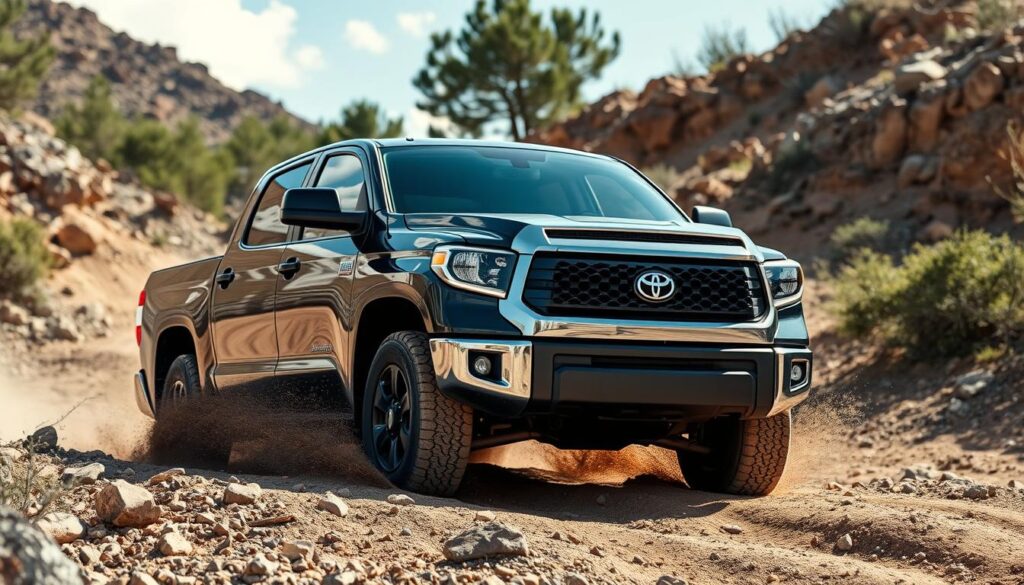
The Toyota Tundra stands out as a paragon of reliability in the full-size pickup truck segment. With its robust 5.7L V8 engine, it offers the perfect blend of power and dependability, making it a favorite among truck enthusiasts.
What Makes the Tundra Stand Out
The Tundra’s legendary reliability is backed by its ability to exceed 300,000 miles with proper maintenance. Its full-size pickup capabilities make it ideal for heavy-duty tasks.
Maintenance Considerations for Tundra Owners
To maintain optimal reliability, Tundra owners should watch out for potential issues like manifold leaks and monitor their mileage for timely maintenance. Regular checks on suspension components, particularly ball joints, are also crucial.
Heavy-Duty Champions: Silverado 2500HD and GMC Sierra 2500HD
When it comes to heavy-duty pickup trucks, the Silverado 2500HD and GMC Sierra 2500HD stand out for their exceptional performance and durability.
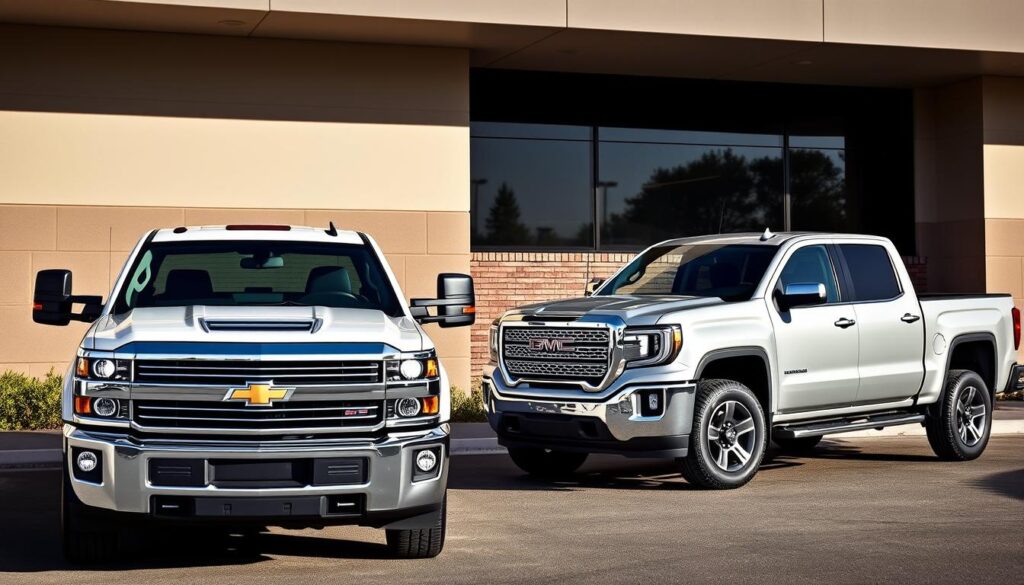
Comparing These GM Siblings
The Chevrolet Silverado 2500HD and GMC Sierra 2500HD are closely related models that share many components, but they also have distinct differences that set them apart in terms of features and reliability.
Reliability Differences Between Model Years
Reliability can vary significantly between different model years of the Silverado 2500HD and Sierra 2500HD, with some years experiencing more issues than others due to factors like engine options and platform changes.
We’ll provide a detailed analysis of reliability trends across different model years, helping buyers identify the most dependable production periods. Significant platform changes, such as those in 2007, 2015, and 2020, have affected reliability.
Certain model years have demonstrated exceptional reliability based on long-term owner data. The 2024 model-year Chevrolet Silverado features a 2.7L high-output I-4 engine with the new TurboMax name and an available Duramax 3.0L turbo-diesel engine on the ZR2 trim.
The truck bed offers 12 standard tie-downs and 89.1 cu.-ft. of cargo space, with an available Multi-Flex tailgate that has six functions.
We’ll examine how different engine options within the same model year can significantly affect long-term reliability, particularly when comparing gasoline V8 versus Duramax diesel variants.
Guidance will be provided on which model years offer the best balance of modern features, capability, and proven reliability for buyers in the used heavy-duty pickup truck market.
Ford’s Super Duty Lineup: F-250 and F-350
Ford’s Super Duty lineup, including the F-250 and F-350, is renowned for its exceptional reliability and durability. Whether you’re hauling heavy loads or navigating challenging terrain, these pickup trucks are designed to deliver.
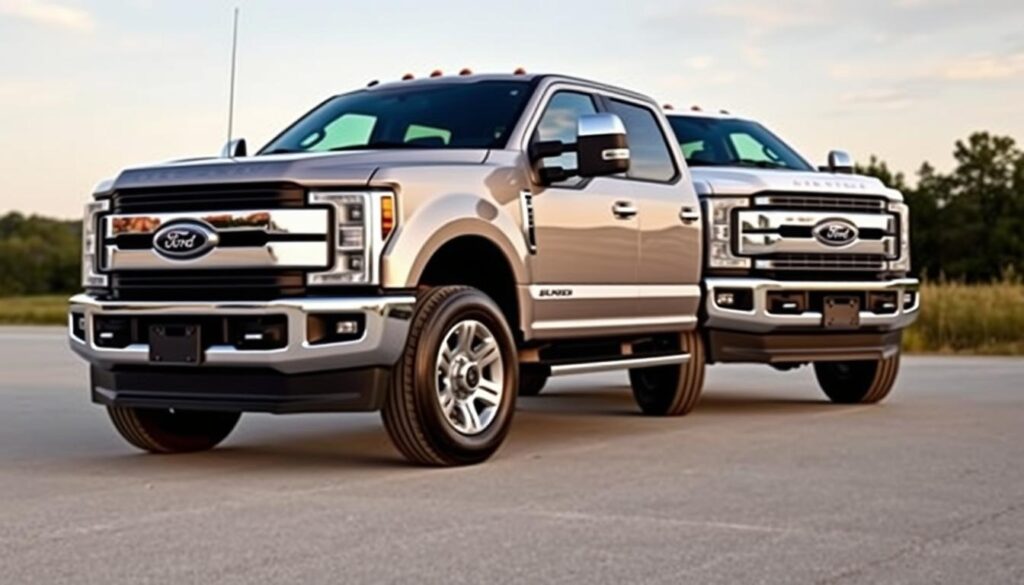
Engine Options and Their Reliability Ratings
The Ford F-250 and F-350 offer a range of engine options, including the gas V8 and the Power Stroke Diesel. Both engines are known for their reliability, with some owners reporting high mileage without major issues. However, diesel models may require more maintenance.
Long-Term Ownership Experience
Owners of the Ford F-250 and F-350 Super Duty trucks often praise their longevity. Many have reported driving their trucks for hundreds of thousands of miles with minimal degradation in performance. We’ll explore the real-world ownership experience, including typical maintenance requirements and costs associated with keeping these trucks on the road.
Some key aspects of long-term ownership include:
- Insights from long-term Super Duty owners who have surpassed 500,000 miles
- Typical maintenance requirements and associated costs
- Performance in various working environments, such as construction sites and long-haul towing applications
- Common wear points that develop over extended ownership
- The strong community support and abundant parts availability for Super Duty trucks
Mid-Size Reliability: Toyota Tacoma and Honda Ridgeline
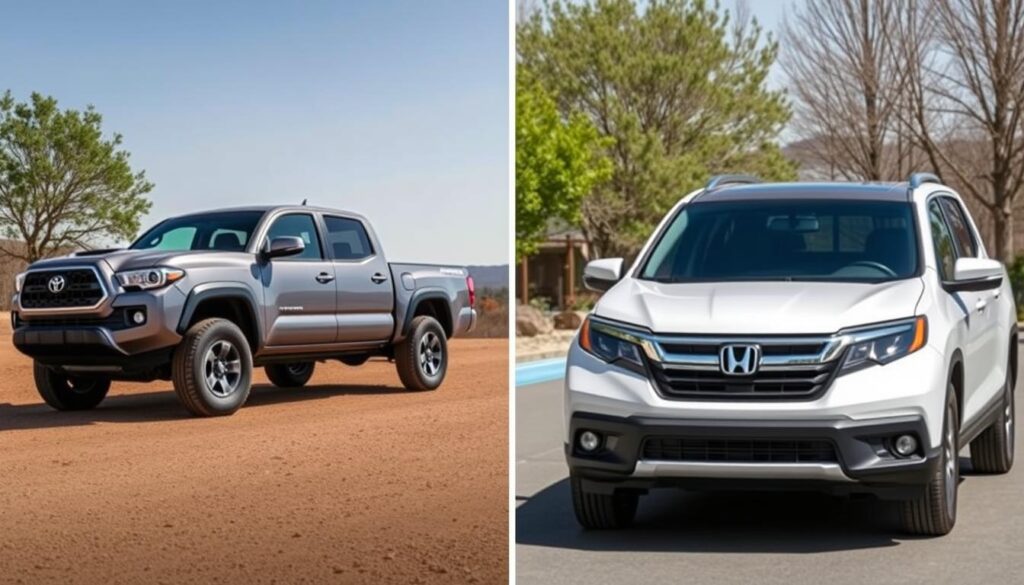
In the competitive world of mid-size trucks, the Toyota Tacoma and Honda Ridgeline have established themselves as reliability leaders. Both trucks have garnered attention for their durability and performance.
Different Approaches to Mid-Size Truck Design
The Toyota Tacoma and Honda Ridgeline approach mid-size truck design differently. The Tacoma features a rugged body-on-frame construction, ideal for off-road enthusiasts. In contrast, the Ridgeline uses a unibody design, prioritizing comfort and convenience. This difference significantly impacts their capabilities and user experience.
Which Mid-Size Truck Is Right for You?
When choosing between the Toyota Tacoma and Honda Ridgeline, consider your specific needs. For off-road adventures, the Tacoma’s available TRD packages and 4WD systems make it a strong contender. For urban and suburban use, the Ridgeline’s superior ride quality and innovative storage solutions may be more appealing. Evaluate your priorities to determine which truck best suits your lifestyle.
Both trucks have demonstrated reliability, with the Tacoma having a 26.7% chance of reaching 250,000 miles and the Ridgeline at 25.8%. This data can help guide your decision based on long-term ownership expectations.
Light-Duty Pickup Reliability: F-150, Silverado 1500, and Ram 1500
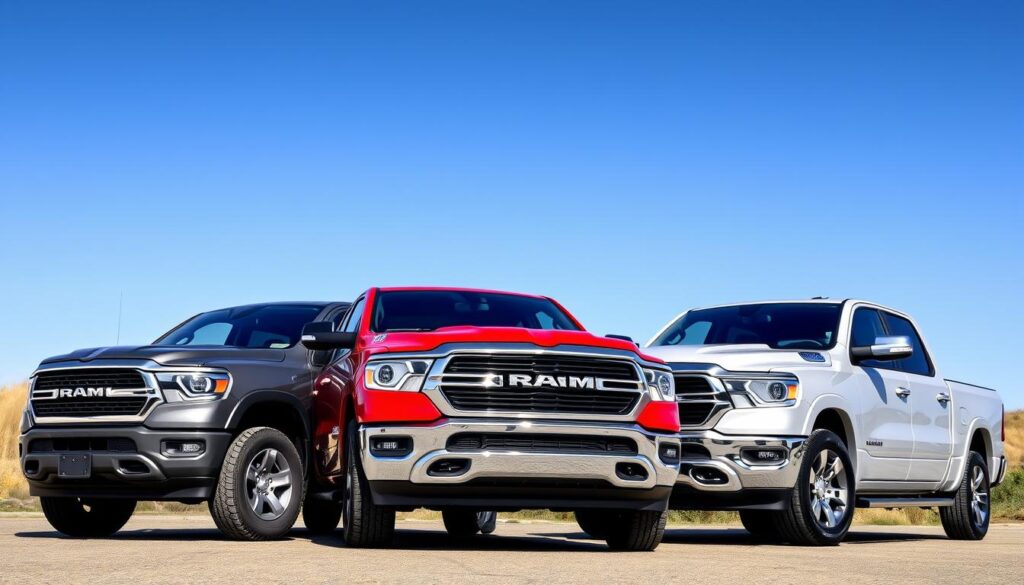
For those in the market for a reliable light-duty pickup, the F-150, Silverado 1500, and Ram 1500 are top contenders. These trucks have garnered significant attention for their performance and durability.
How These Popular Models Stack Up
The 2014-2018 Chevrolet Silverado 1500 stands out for its reliability, with many units surpassing 250,000 miles. The 2009-2014 Ford F-150 generation is also notable for its robust powertrain options and refined build quality. Meanwhile, the 2013-2018 Ram 1500 models introduced innovative features like coil-spring rear suspension while maintaining solid reliability ratings.
Best Model Years for Reliability
When examining the best model years, it’s clear that certain generations stand out. For the Silverado 1500, the 2014-2018 models are particularly reliable. For the F-150, the 2009-2014 generation is a good choice. The Ram 1500’s 2013-2018 models also demonstrate strong reliability.
10 Essential Maintenance Tips to Help Your Truck Reach 250,000 Miles
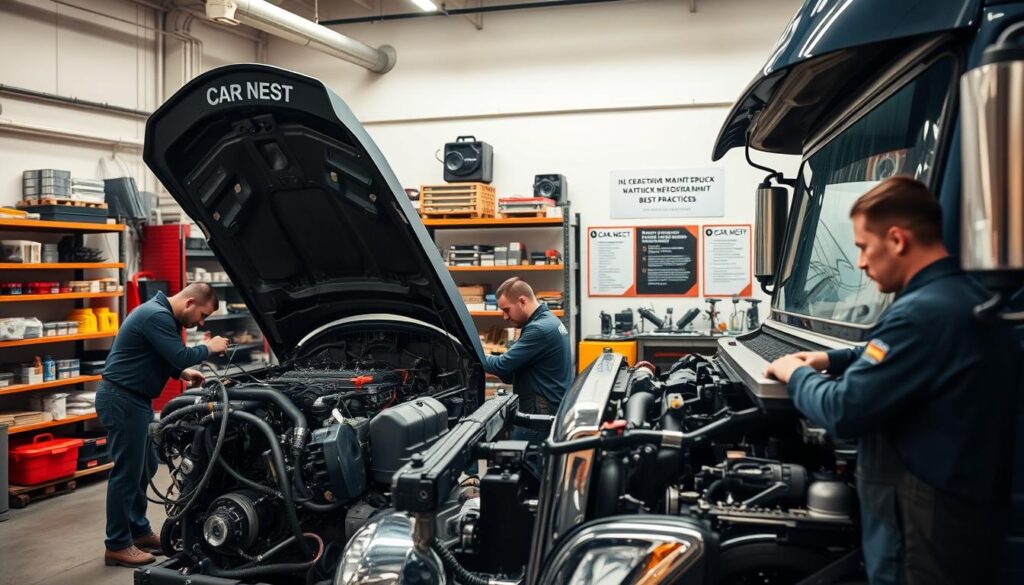
The key to extending your truck’s lifespan to 250,000 miles lies in consistent and thorough maintenance. By following a few essential tips, you can significantly enhance your vehicle’s durability and performance.
Regular Maintenance Schedules
Adhering to a regular maintenance schedule is crucial for the longevity of your truck. This includes routine checks on vital components such as the engine, transmission, and brakes. Regular oil changes, filter replacements, and tire rotations are fundamental to maintaining your truck’s health. By staying on top of these tasks, you can prevent minor issues from escalating into major problems.
| Maintenance Task | Frequency | Benefits |
|---|---|---|
| Oil Change | Every 5,000 to 7,500 miles | Reduces engine wear, improves fuel efficiency |
| Tire Rotation | Every 6,000 to 8,000 miles | Ensures even tread wear, improves traction |
| Brake Pad Replacement | Every 30,000 to 50,000 miles | Enhances stopping power, safety |
Addressing Common Issues Before They Become Major Problems
Being proactive about maintenance involves identifying and addressing potential issues before they become significant. This includes monitoring your truck’s performance for signs of trouble, such as unusual noises, decreased power, or changes in handling. By addressing these issues promptly, you can prevent costly repairs down the line.
Key areas to focus on include:
- Engine performance and any signs of leaks or unusual sounds
- Transmission issues, such as delayed engagement or soft shifting
- Suspension and steering components for wear or excessive play
- Electrical system health to prevent cascading failures
- Fuel system maintenance, including injector cleaning and filter replacement
By following these maintenance tips and staying vigilant about your truck’s condition, you can significantly increase its chances of reaching 250,000 miles or more. Regular maintenance not only enhances your vehicle’s longevity but also ensures it remains reliable and performs well over its lifespan.
The Future of Truck Reliability: Electric and Hybrid Models

As we look to the future, electric and hybrid models are set to redefine truck reliability. The automotive industry is witnessing significant advancements in electric drivetrains, battery technology, and sustainable materials, which could potentially extend the lifespan of trucks.
Impact of New Technologies on Long-Term Reliability
The integration of hybrid powertrains, such as Toyota’s i-FORCE MAX, is enhancing performance while potentially improving longevity. For instance, the 2024 Toyota Tundra i-FORCE MAX hybrid produces 437 horsepower and 583 lb.-ft. of torque, achieving an EPA-estimated 20-24 MPG. Smaller, turbocharged engines paired with electric motors are delivering power comparable to traditional V8s, potentially improving reliability through reduced displacement and operating temperatures.
Next Generation of Trucks
We can expect the next generation of trucks to feature advanced materials and manufacturing techniques, such as high-strength steel frames and composite body components, to improve durability while reducing weight. Additionally, the increasing software dependency in modern trucks creates new reliability considerations, including the importance of over-the-air updates and electronic system durability. Autonomous driving features and advanced driver assistance systems may also affect long-term reliability by reducing driver error.
Conclusion: Making the Right Choice for Your Reliable Truck
As we conclude our exploration of the most reliable trucks, it’s clear that longevity and performance are key considerations for buyers. Our analysis has shown that models like the Ram 3500 and Toyota Tundra stand out with impressive longevity statistics, having a 42.6% and 36.6% chance of reaching 250,000 miles, respectively.
When selecting a truck, it’s crucial to balance reliability ratings with factors like intended use and budget. Regular maintenance also plays a vital role in achieving maximum longevity. For personalized advice on choosing the most reliable pickup trucks for your needs, feel free to contact us via WhatsApp at +44-7822010953. By considering these factors and looking beyond the 100,000-mile mark, you can make an informed decision and enjoy a reliable truck for years to come.


